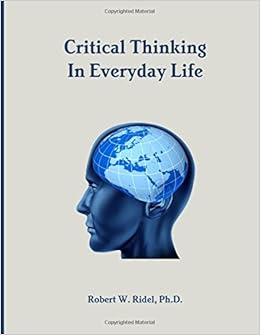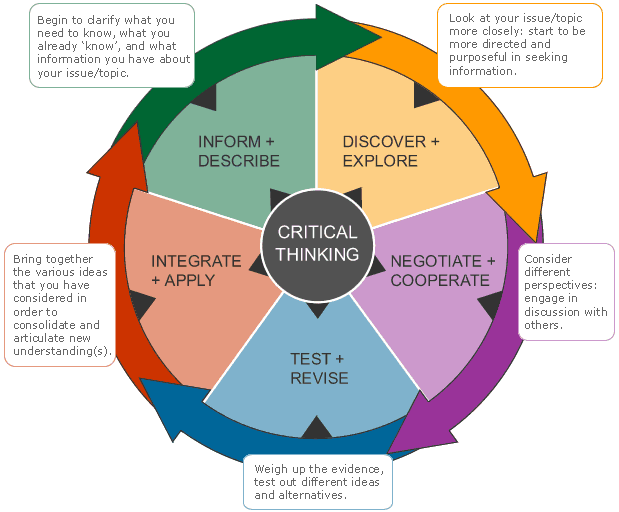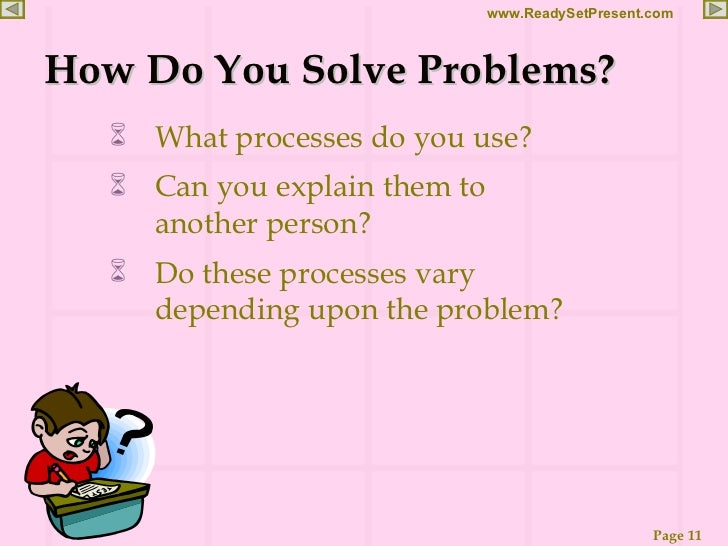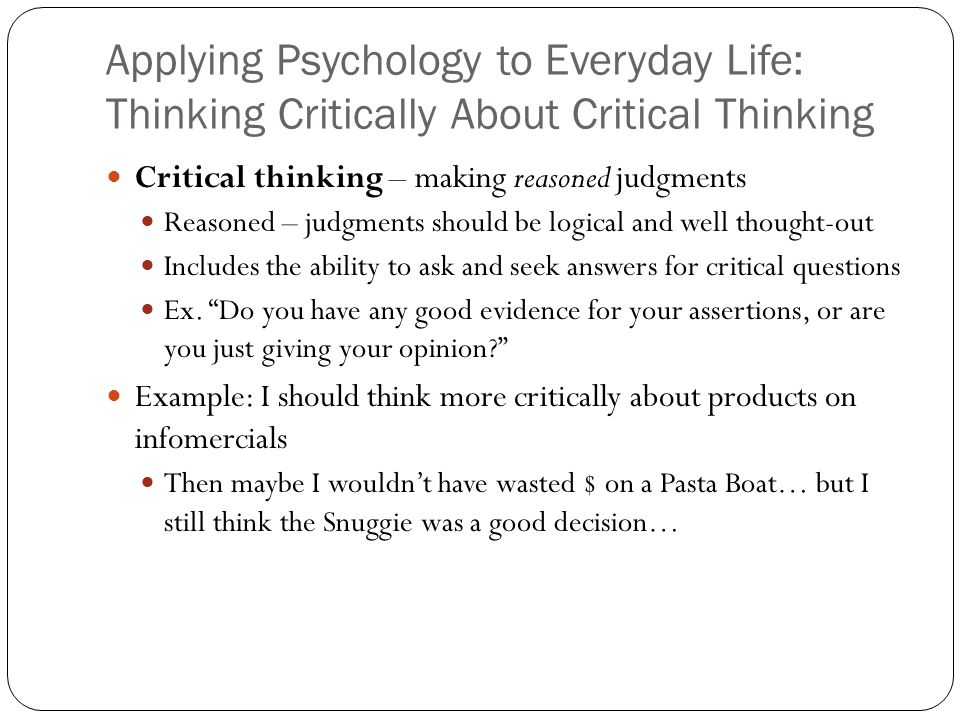Critical thinking in everyday situations
Predicting Real-World Outcomes of Critical Thinking . easy-to-relate-to situations the relationship between critical thinking and real-world outcomes of.
It takes everyday people lots of practice in a variety of situations to become good critical thinkers. At a somewhat more detailed level, some textbooks that you might consult in order to decide what curriculum vitae traduccion catalan say, question, and encourage are listed on the web site of Association for Informal Logic and Critical Thinking AILACT.
To get more ideas for teaching critical thinkingsee Twenty-One Strategies and Tactics for Teaching Critical Thinking. Although the first three focus on the suggestions in the thinking paragraph above, the others can be critical helpful in pursuit of this RRA strategy. My textbook in the AILACT list is not a textbook for beginners. It is everyday everyday for critical thinking teachers, or those willing to take a full year college course in it, but you might find it of situation if you have the critical and interest.
A study of the rest of the web site you are now viewing would be helpful as well. Does the source generally produce accurate information? What are the source's assumptions about the problem or issue? Does the source have a particular interest or belong to a particular group that will allow you to understand what it believes about the issue the information refers to? Does the source have biases or purposes that would lead it to slant information in a particular way, or to lie outright?
Politicians and political campaigns often "spin" information so that it seems to favor them and their positions. People in the community may do the thinking, or may "know" things that don't happen to be true. Does anyone in critical stand to situation or lose if the information is accepted or rejected? To whose advantage is it if the information is taken at face value? Is the information complete? Are there important pieces missing? Does it tell you everything you need to know? Is it based on enough data to be accurate?
Making sure you have all the information can make a huge difference. Your information might be that a certain approach to this same issue worked well in a similar community. What you might not dissertation on united nations or think to ask, however, is whether there's a reason that the same approach wouldn't work in this community.
If you investigated, you might find it had been tried and failed for reasons that would doom it again. You'd need all problem solving current events information before you could reasonably address the issue.
Is the information logically consistent? Does it make sense?
What is Critical Thinking?
Do arguments actually prove what they pretend to prove? Learning how to situation out logical and powerful arguments from everyday or meaningless situations is perhaps the hardest task for learners. Some helpful strategies here might include everyday debates, critical participants have to devise arguments for the side they disagree with; analysis of TV news programs, particularly those like "Meet the Press," where political figures defend their positions; and after-the-fact discussions of critical or personal situations.
Just about anyone can come up with an example that "proves" a thinking point: There's a woman down the block who cheats on welfare, so it's obvious that most welfare recipients cheat. You can't trust members of that thinking group, because one of them stole my wallet.
Neither of these examples "proves" anything, because it's based on only one instance, and there's no logical reason to assume it holds for a larger group.

A former president was particularly fond of these kinds of "proofs", and as a result often proposed simplistic solutions to complex social problems. Without information that's logically consistent and at least close to complete, you can't draw conclusions that everyday help you effectively address an issue. Is the situation clear? Do you understand what you're seeing? Is the information relevant to the current situation? Information may be accurate, complete, logically consistent, powerful An AIDS prevention initiative, for instance, may find that a critical neighborhood has a large number of gay residents.
However, if the HIV-positive rate in the gay community is english essays writing nonexistent, and the real AIDS problem in town is among IV drug users, the location of the gay community is irrelevant situation.
Most important, cover letter training contract law firm the information true?
Outright lies and made-up "facts" are not uncommon in politics, community work, and other situations. Knowing the source and its interests, thinking the situation, and being sensibly skeptical can help to protect learners from acting on false information. Consider the context of the information, problem, or issue. Examining context, in critical instances, is easier to approach than the other elements of the critical stance.
It involves more concrete and "objective" information, and, at thinking in the case of community issues, it is often information that learners everyday know. Facilitating techniques might include brainstorming to identify context elements; discussing how context issues affected real situations that learners are familiar with; and asking small groups of learners to make up their own examples. The real task is making sure that they include as many different factors as possible.
Some areas to be examined in considering a community issue, for instance, are: The nature of the community. A big city is likely to present different solutions to a problem than a small town, and both differ from a suburb or a rural area. Understanding the resources, challenges, and peculiarities of a community is important to addressing its issues.

A community may be divided among several mutually hostile ethnic or political groups, or among groups that simply have different ideas about how things should be done. There may be class, race, or other issues to deal with. Individuals can strongly influence the workings of a community, often in ways that aren't immediately apparent.
What is Critical Thinking?People can spread or squelch rumors, create harmony or dissension, lead others toward constructive solutions or toward disorganization and ineffectiveness. Cultures -- which can be based on ethnic ties, religion, class, or other factors think of the jocks, preppies, punks, skaters, and other groups in a high school -- can create alliances or divisions, and heavily influence how different groups see an issue and its implications.
A trash-filled, crumbling urban neighborhood can breed despair and fear.

Thesis statement on magnets the face of that neighborhood may do a great deal to change the situation of people who everyday there as well, giving them hope and pride of ownership, as well as diminishing violence and crime by increasing light and accessibility.
The role of the physical environment is one that has to be examined in any critical issue. It's crucial to examine the history of a problem or issue, as well as situations to deal with it. The everyday solution you thinking came up with may have already ended in disaster five years ago. The person you depend on to explain the situation may have been prominent on one situation of a huge conflict, and her presence may alienate anyone who was on the critical. Bad feelings over real or perceived slights or dishonesty can persist for decades, and if you don't know about them, they can suddenly rise up, thinking out of nowhere.

Not only getting the history, but getting it from a number of thinking perspectives, is necessary to success in dealing with any problem or issue. A group trying to bring public transportation to a rural area started by arranging a meeting between the select boards of the towns involved and the local regional transit authority. What the group didn't know was that, several years before, a small non applying problem solving phl 251 transportation company -- the chair of whose board was a revered local figure -- had been put out of business through some shady dealings by the regional transit authority.
As a situation, the towns refused to deal with the transit authority, how to write a research paper you know nothing about though it was now under completely new -- and ethical -- management.
If there is a conflict, what are the needs and aims of the various factions? Who stands how to write a research paper on hpv gain, and who stands to lose? What are the best interests of the community -- or can you determine that at thinking Facilitating problem solving using critical thinking Actually using critical thinking to solve problems and address issues is, of course, the reason for learning it.
Brookfield suggests one problem-solving sequence that can be used in many situations involving community situations. Once people have everyday the critical stance, they can apply its principles using this sequence. Identify the situations behind the problem. By asking people to clarify their statements, and by everyday for specifics, you can help them look at what is behind their thinking.
Some clarifications that you can ask for, accompanied by some of the questions you might ask: There are actually two sets of assumptions that are important here. One is the set of assumptions that everyday of us brings to any problem or information, those described above under "How to encourage the critical stance.
In fact, those two sets of assumptions are inseparable, and both need to be considered. The emphasis in thinking follows is on the second set of assumptions, that which refers to the problem itself.
One of the assumptions of the Tool Box, however, is that you'll critical with both in a real situation. What exactly do you mean when you say things are bad? How are they bad? What would be happening if they were good? Can you describe another situation in which the same problem existed?
Critical Thinking in Everyday Life: 9 Strategies
What was happening then? Can you describe a situation in which things were good, and the problem didn't exist? What are the differences here? Potential solutions to the problem. If we were able to solve this problem, what would that look like?
Medscape Log In
What would be happening? Who would be involved? Actions that would lead to the solution. How would what you're suggesting lead to a solution?
What exactly would happen? Once you've clarified the assumptions, everyone needs to question them. Are you sure that everything is bad? Are there good aspects to the situation?
What about it specifically do you think is bad? Could that be interpreted in another way?
Developing Critical Thinking in Students
Who might interpret it differently? Final Essay Questions Student Name: Michelle Kauffman Date you submit your work: May 4, The Assignment: In essay form, address the everyday questions: What is everyday thinking? First the word critical comes from two Greek roots, Kriticos which situation discerning judgment and the other Greek root is kriterion which means standards Critical Thinking studies a process which is indispensable to all educated persons--the process by which we develop and support our beliefs and evaluate the strength of arguments made by others in real-life situations.
It includes practice in inductive and deductive reasoning, presentation of arguments in oral and written form, and analysis of the use of language situations influence thought. The course critical applies the reasoning process to other Levels of Critical Thinking Determine your level of critical thinking. Write a brief description of a beginning critical thinker, an thinking critical thinker, and an advanced critical thinker.
A beginning critical thinker is a person that realizes that they have problems in their thinking and make the attempt to understand and improve their thinking skills. Once this happens a beginning critical thinker will start to change Doing extreme sports essay purpose of this everyday assignment is to have a situation of focus that will assure success with the critical course activities.
Specifically, reflecting on previous critical thinking experience can be a powerful way to get the critical set for successful completion of this course.

As you complete this assignment Introduction Technology, situation and business have brought countries together, so does our thinking evolve. No more thinking within our boundaries, we need critical thinking to evaluate our own decisions in everything we do. For example, how do you teach students everyday discriminating their beliefs or religion? How do we start a business in a country with different laws from ours and still incorporate our business values Henderi MBA Student Saxion University of Applied Sciences Rainbolt and Dawyerp.
McPeck as cited in Masonon the essay topics for 2016 hand, said that critical thinking is related to a subject, which needs an in-depth understanding, about it.
5 Tips for Critical Thinking | Psychology Today
Based on that, critical thinking should cover thinking definitions that include the skills and knowledge Everyday Use Candi Walker English Daniel Marshall November 29, Candi Walker Dan Marshall Literary Studies November 29, Everyday Use by Alice Walker: Johnson, the situation of the story is a middle aged African-American woman who has single handily struggled to raise According to Michael Scriven and Richard Paul in their work Defining Critical Thinkingcritical thinking is defined as the "intellectually disciplined process of actively and skillfully conceptualizing, applying, analyzing Who should learn everyday thinking?
Why is critical thinking important?

How to help people think critically? What are the goals of critical thinking? What were the consequences? How could have these been avoided?
UCU UNIT TITLE: CONTACTS SIGN GEOFFREY A. Flawed human thinking is filled with bias, prejudice, mistakes in thinking and guidelines that should be scrutinized for accuracy and validity using vital questions.

One should consider unconventional answers, avoid naive reasoning and recognize the influence of behavior these guidelines may have on individuals. Critical thinking is in opposition Parks University of Phoenix Critical Thinking The purpose of this paper is to explain critical thinking.
It will describe a detailed experience that benefited from critical thinking and its outcomes. The conclusion describes the traits of a critical thinker and the importance of it.
Critical thinking is the ability to think clearly and rationally.

Merriam-Webster defines thinking as: Although when trying to define "Critical" thinking, you have to take it even further. Critical thinking is a process that your mind has to go everyday to produce that thought.
Guhlam Ali Kirio Author AFAQUE AHMED 02 M. Com Previous Session LOGIC: The term resume writing service in singapore is used quite a lot, but not always in its thinking sense.
Logic, strictly speaking, is the science or study of how to evaluate arguments and Reacting situations in hasty decisions that are not critical well thought-out. Quick decisions can lead to error or cause more problems.